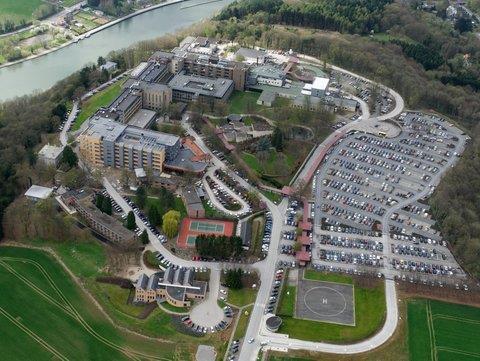
The CHU UCL Namur in Godinne will become the first hospital in Belgium to get most of its power from green sources thanks to the implementation of an innovative biomass gasification process. “The implementation of this project is a clear demonstration of how the fight against climate change is in full swing at all levels, and that this kind of operation is entirely justified from an economic standpoint,” said EIB Vice-President Pim van Ballekom.
Belgium's first trigeneration unit powering a hospital site with renewable energy via biomass gasification was inaugurated today in Godinne, Namur Province. At the heart of this facility is a cutting-edge Xylowatt NOTAR® reactor (gasifier) that turns waste wood into renewable gas. The project is both innovative and sustainable, making it possible to cover 40% of the hospital's electricity requirements, 65% of its hot water needs (for sanitary use and heating) and 40% of the useful energy of its refrigeration circuits. It was financed directly by Belfius, with part of the funding falling under its agreement with the EIB designed specifically to facilitate investment in energy efficiency and decentralised renewable energy production.
This trigeneration facility is a “first” on more than one level. The gasifier used on the CHU UCL Namur Godinne site uses Xylowatt's unique, patented NOTAR® technology, which makes it possible to produce clean gas without waste tar – meaning that no expensive additional processing is needed and there are no environmental side effects – using waste in the form of natural wood (branches from roadside and park maintenance, forestry industry waste, etc.) and recycled wood (damaged pallets, wooden packaging, etc.).
A win-win partnership for a technological and environmental advancement
Xylowatt's NOTAR® technology has the advantage of integrating into so-called “trigeneration” facilities able to heat, cool and produce electricity using local renewable biomass.
With total power capacity of 620 kWe, 1 100 kWth heating and 680 kWth cooling, the facility, which is not dependent on the wind or sun, will provide CHU UCL Namur with a continuous renewable energy production alternative (available 24/7) using local, renewable and accessible biomass, and is fully in line with a circular economy approach. Thanks to this win-win partnership with Louvain-la-Neuve-based company Xylowatt, CHU UCL Namur will become the first Belgian hospital to be powered primarily by green energy.
A unique and favourable financing solution in partnership with the EIB
For the implementation of this project, Xylowatt, via its subsidiary Mont Godinne Green Energy (MGGE) as third-party investor, was in particular able to use a new form of financing – the first of its kind in Belgium. This financing was developed by Belfius and the European Investment Bank (EIB) to promote and facilitate investments in energy efficiency and decentralised renewable energy production.
In an effort to reduce their environmental footprint and costs, a number of companies, institutions and other organisations wish to invest, on a small or large scale, to improve the energy efficiency of their buildings, lighting systems, machines, heating networks, etc., or to produce decentralised renewable energy to cover their own needs. It was to help them with this initiative that, in late 2016, the partner institutions signed a contract for a total of EUR 75m under the new Private Finance For Energy Efficiency (PF4EE) instrument. This instrument was jointly established by the EIB and the European Commission (LIFE programme) to address the lack of tailored, affordable commercial finance available for energy efficiency investments.
Resulting from this partnership is the Belfius Energy Efficiency Package (BEEP), a unique form of financing that is not only aimed at companies wishing to invest directly in energy efficiency, but can also be used to implement similar projects, benefiting businesses, public authorities, hospitals, schools, public or private not-for-profit associations, etc., via an energy sector company acting as third-party investor, such as MGGE in the case of the CHU UCL in Mont-Godinne project.
Thanks to the terms of the EU funds, the exclusive EIB guarantee and the partial refund of energy audit fees (for businesses), Belfius plans to use this kind of financing aimed at this investment type to make a practical and targeted contribution to cutting CO2 emissions in Belgium, thereby combating global warming.
Dirk Gyselinck, member of the management board at Belfius, said: “As a long-standing partner of the hospital sector and numerous companies, we are particularly happy to have financed this innovative and sustainable project that will make it possible to drastically reduce the CO2 emissions of CHU UCL Namur's Godinne site. Thanks to the Belfius Energy Efficiency Package developed with the EIB, this project in is the very first to have been part-financed under our agreement with the EIB to promote energy efficiency and the production of decentralised renewable energy in Belgium.”
EIB Vice-President Pim van Ballekom said: “The implementation of this project is a clear demonstration of how the fight against climate change is in full swing at all levels, and that this kind of operation is entirely justified from an economic standpoint. We are pleased to have been able to make a contribution by putting this new partnership with Belfius into action for the first time, boosting energy efficiency investments in Belgium. By applying an integrated and global approach – better energy performance, improved use of natural resources, circular investment projects, and smart and sustainable urban development – we will quickly have a direct impact on our environment and people's daily lives.”
Vincent Lachapelle, Director of the Godinne hospital site, stated: “With this partnership, CHU UCL Namur is positioning itself even closer to the cutting edge of environmental innovation. Our institution is continuing to make progress on its objectives for process quality and infrastructure improvement.”
Jürgen Bohn, the new CEO of Xylowatt, commented: “This partnership clearly falls under Belgium's COP21 energy transition commitments. Xylowatt's technology will make it possible to cut the Godinne site's CO2 emissions by more than 3 000 tonnes a year, i.e. the emissions equivalent of 2 000 vehicles!”

